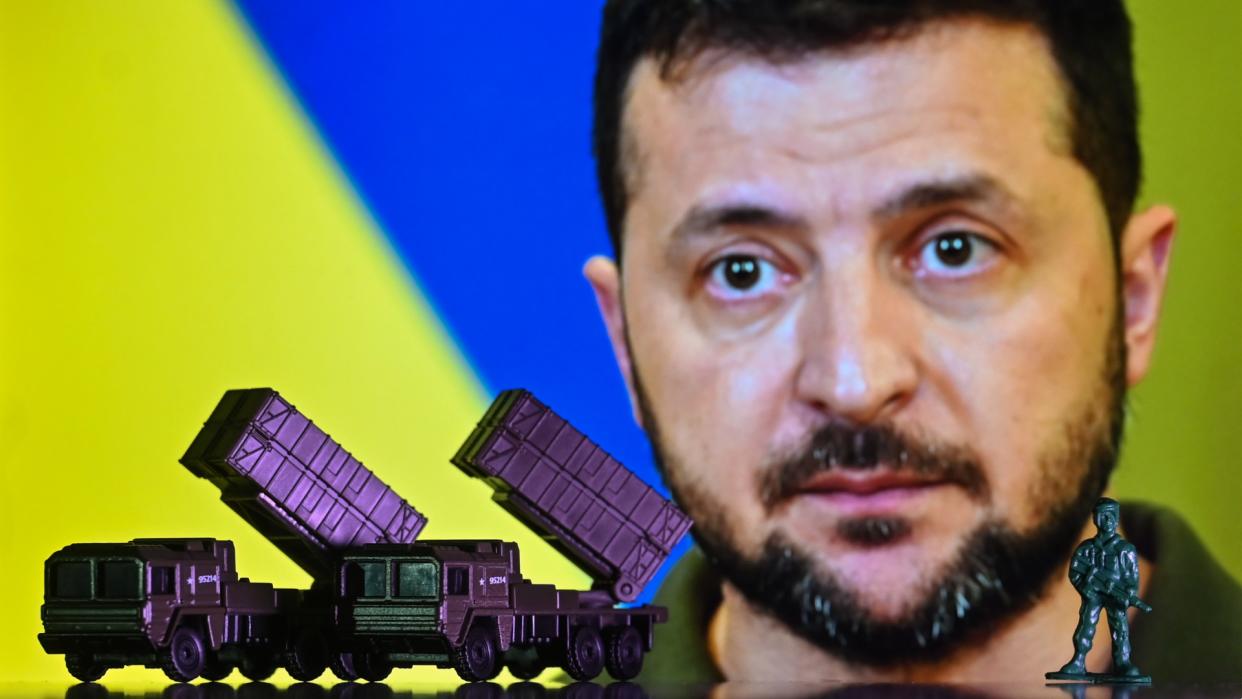Will Iran attack hinder support for Ukraine?

- Oops!Something went wrong.Please try again later.
Supporters of Ukraine have accused the US and its allies of showing double standards in rushing to Israel's air defence after refusing to intervene in Russian missile attacks on Kyiv for more than two years.
The US, UK, France and Jordan were instrumental in helping Israel to destroy 99% of more than 300 missiles, rockets and drones launched by Iran on Saturday. The "show of airborne prowess" by Western allies and their partners in the Middle East "proved the effectiveness of Israel's missile defence system when combined with some of the world's most advanced aircraft", said Politico. But "it also pointed to a yawning difference in the way Western powers treat Israel compared to Ukraine".
What did the commentators say?
With Ukraine facing hundreds of missile and drone attacks every week, the response by Western allies to the aerial assault against Israel has produced "uncomfortable comparisons", said The New York Times. While Washington and other allies have provided Kyiv with tens of billions of dollars in military equipment and ammunition – including powerful air defences – since the war began, "they have not directly confronted Russian forces".
"It's very stupid; it's hypocrisy," a resident of the embattled Ukrainian city of Kharkiv told the paper. "And it's like some devaluation of Ukrainian lives."
When asked on LBC why the RAF couldn't shoot down drones over Ukraine as they had in Israel, Foreign Secretary David Cameron said that doing so would risk a dangerous "escalation" involving "Nato troops directly engaging Russian troops".
Ukraine's President Volodymyr Zelenskyy countered on X that "Israel is not a Nato member, so no action, such as triggering Article 5, was required" – referring to the Nato provision on collective defence that regards an attack on one as an attack on all. "No one was dragged into the war," he wrote. "They simply contributed to the protection of human life."
Pro-Kyiv supporters argue that Israel's successful defence shows that the key problem for Ukraine is an unwillingness by the West to provide the supplies and support needed to defeat Russia.
But the US has "fundamentally different security relationships" with Israel and Ukraine, said The Wall Street Journal. The hesitancy towards a more combative stance against Russian attacks is "shaped by concerns" that Vladimir Putin "could resort to nuclear arms".
Ukraine is also facing a more capable enemy than Israel, according to Ben Hodges, a former commanding general of US Army Europe."I don't know or believe that Iranian attacks can match the quality or capability of Russian attacks against Ukraine," he told DefenseOne.
What next?
"The Middle East entering uncharted territory (short of full-blown war) is the best that can happen to Putin now," Hanna Notte, a senior associate with the Europe, Russia, and Eurasia Program at the Washington-based Center for Strategic and International Studies, wrote on X.
For the Kremlin, "the potential benefits to be reaped from Iran's attack on Israel are both broad and quite specific", said Radio Free Europe. It firstly "draws attention away from the war in Ukraine at a crucial time when Kyiv is facing major challenges on the front line". And in the context of Putin's claims about a wider confrontation against global liberal-democratic forces, Iran's attack "may play into the Kremlin's propaganda, handing Russia new material it can use to press its public narratives about the war in Ukraine and its showdown with the West".
More specifically, the attack against Israel "adds a new element to the uncertainty over the prospects for long-delayed US aid for Ukraine", said the news service.
The question now for obstructive House Republicans, said The Independent, "is what change this new development has on the calculus around the supplemental aid package meant to bolster the militaries of both Israel and Ukraine".
Amid talk of escalation in both Europe and the Middle East, one key difference between Ukraine and Israel could play into Western thinking: nuclear capability.
"The answer seems to be that the US is desperate to, in its mind, limit the chance of Israeli escalation and is not really that bothered about Ukraine having the ability to escalate," said Phillips O'Brien in the Kyiv Post. "Well, the big difference in escalation concerns is that Israel is a nuclear power and Ukraine is not."

